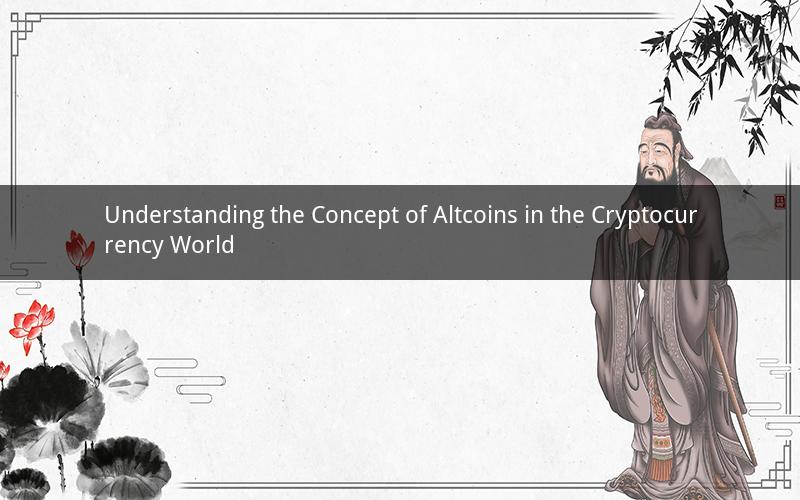
Introduction:
In the ever-evolving world of cryptocurrencies, altcoins have emerged as a significant part of the ecosystem. Altcoins, short for alternative coins, are digital currencies that are not Bitcoin. They offer unique features and benefits, making them popular among investors and enthusiasts. This article aims to delve into the concept of altcoins, their significance, and how they differ from Bitcoin.
1. What is an Altcoin?
An altcoin is a cryptocurrency that operates independently of Bitcoin. While Bitcoin remains the largest and most well-known cryptocurrency, altcoins offer alternative features, technologies, and use cases. These coins are often developed to address specific issues or to provide additional functionalities that Bitcoin lacks.
2. The Significance of Altcoins
Altcoins have gained popularity for several reasons. Here are some key aspects that highlight their significance:
a. Diversification: Altcoins provide investors with a diverse range of options beyond Bitcoin. This diversification allows them to spread their investments across different cryptocurrencies, reducing the risk associated with any single coin.
b. Innovation: Many altcoins are built on new technologies and offer unique features that differentiate them from Bitcoin. These innovations can range from enhanced security measures to improved scalability and privacy features.
c. Use Cases: Altcoins often have specific use cases or industries they cater to. For example, Ethereum is widely used for decentralized applications (DApps), while Litecoin focuses on faster transaction speeds.
3. How Altcoins Differ from Bitcoin
While altcoins share similarities with Bitcoin, there are several key differences:
a. Technology: Altcoins often utilize different blockchain technologies or protocols compared to Bitcoin. This allows them to offer unique features and address specific challenges.
b. Market Capitalization: Altcoins generally have lower market capitalizations compared to Bitcoin. This can make them more volatile and subject to significant price fluctuations.
c. Community and Development: Altcoins often have smaller communities and fewer developers compared to Bitcoin. This can impact their long-term viability and ability to adapt to changing market conditions.
4. Popular Altcoins
Several altcoins have gained significant traction in the cryptocurrency market. Here are a few notable examples:
a. Ethereum (ETH): Ethereum is the second-largest cryptocurrency by market capitalization. It is widely recognized for its smart contract functionality, which enables the creation of decentralized applications.
b. Ripple (XRP): Ripple is designed to facilitate cross-border payments and financial transactions. It aims to provide a more efficient and cost-effective alternative to traditional banking systems.
c. Litecoin (LTC): Litecoin is often referred to as the "silver" to Bitcoin's "gold." It offers faster transaction speeds and lower fees compared to Bitcoin.
5. Risks and Considerations
Investing in altcoins carries certain risks and considerations:
a. Market Volatility: Altcoins are known for their high volatility, which can lead to significant price fluctuations. Investors should be prepared for both rapid gains and losses.
b. Security Concerns: While altcoins aim to address security issues, some may still be vulnerable to hacking or other cyber threats. It is crucial to conduct thorough research before investing.
c. Regulatory Uncertainty: The regulatory landscape for cryptocurrencies is still evolving, and altcoins may face legal and regulatory challenges in different regions.
Frequently Asked Questions:
1. What is the difference between Bitcoin and altcoins?
Bitcoin is the first and most well-known cryptocurrency, while altcoins are alternative cryptocurrencies that offer unique features and use cases.
2. Are altcoins more volatile than Bitcoin?
Yes, altcoins tend to be more volatile than Bitcoin. This volatility can result in significant price fluctuations in a short period.
3. Can altcoins replace Bitcoin?
While altcoins offer unique features and use cases, it is unlikely that they will completely replace Bitcoin. Bitcoin remains the dominant cryptocurrency and continues to evolve.
4. How can I invest in altcoins?
Investing in altcoins can be done through various platforms, including cryptocurrency exchanges. It is essential to research and choose a reputable exchange to ensure the safety of your investments.
5. Are altcoins a good investment?
Investing in altcoins can be lucrative, but it also carries risks. It is crucial to conduct thorough research, understand the market, and only invest what you can afford to lose.